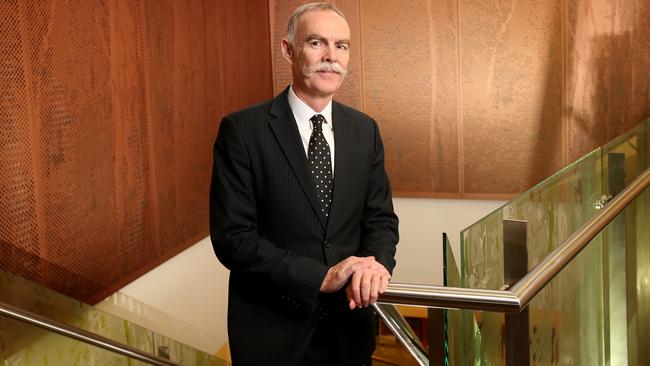AustralianSuper chief Ian Silk takes aim at banker bonuses
The CEO of AustralianSuper has sharply criticised some financial institutions’ approach to executive pay.

The nation’s biggest superannuation fund will vote against the remuneration reports of three major banks in the coming annual-meeting season, increasing the likelihood of first strikes against Westpac, National Australia Bank and ANZ.
Amid a growing backlash against misconduct highlighted by the financial services royal commission, AustralianSuper chief executive Ian Silk said he was disappointed by the approach to executive pay taken by the boards of the three banks.
“That the banks are proposing paying a bonus to executives this year indicates that the thresholds for ‘at risk’ pay are too low,” Mr Silk said.
“Low thresholds effectively make ‘at risk’ payments part of fixed pay.
“AustralianSuper wants to see appropriate thresholds which clearly demonstrate how any payment above a fixed pay component is linked to long-term value creation.”
A first strike is earned when a company’s remuneration report attracts a “no” vote of more than 25 per cent, with a second consecutive strike leading to a shareholder vote on a board spill.

Mr Silk’s sharply critical commentary about bankers’ pay positions him with the Australian Council of Superannuation Investors, retail shareholders through the Australian Shareholders’ Association, and various proxy advisory groups.
He was joined on Friday by David Elia, chief executive of the fellow industry fund Hostplus.
The fallout means that the remuneration reports of Westpac and NAB are almost certain to earn a first strike at annual meetings on December 12 and December 19 respectively.
The fate of ANZ, which has scheduled its annual meeting on the same day as NAB, is less certain, although a strike is still likely.
Commonwealth Bank avoided the wrath of shareholders at last month’s annual meeting by slashing executive bonuses to zero in 2017, after Austrac had targeted the bank for multiple transgressions of anti-money-laundering legislation.
CBA also restructured its board, appointed Matt Comyn as its new chief executive, and conducted a clean-out of its leadership team.
AustralianSuper has one of the most powerful voices in the nation on governance issues.
The fund, which manages more than $140 billion in retirement savings on behalf of 2.2 million members from 270,000 businesses, is the nation’s biggest holder of major-bank stock, with a $7.5bn portfolio. It has holdings of 2-2.5 per cent in each of Westpac, NAB and ANZ.
Mr Silk said it had been an “annus horribilis” for the banking sector, with a lack of transparency from the banks around their rationale for paying executive bonuses in 2018.
“While the banks have acknowledged the need for executive accountability, there is no clear basis provided as to why bonus payments and incentives for senior executives were at the right level,” he said.
The AustralianSuper chief singled out NAB for particular criticism, saying the fund was “deeply concerned” about the lack of connection between the bank’s bonus payments and long-term performance under its revised remuneration structure.
Mr Silk said boards should set appropriate thresholds in remuneration structures, and then explain to shareholders how the structure was aligned to long-term value creation.
Mr Elia said Hostplus, which has $33bn under management, was generally supportive of companies paying bonuses to executives.
“However, we do not consider ANZ, NAB and Westpac’s incentive outcomes to be appropriate in the context of their performance and the recent issues revealed,” he said.
“Sustainable investment returns cannot be achieved if executive rewards encourage short-term behaviours that maximise bonuses, at the expense of the return to investors.”
Mr Elia noted Hostplus voted in favour of CBA’s remuneration report earlier this year, as the fund believed that changes to the bank’s bonus and long-term incentive structures were appropriate in the light of its recent issues.



To join the conversation, please log in. Don't have an account? Register
Join the conversation, you are commenting as Logout